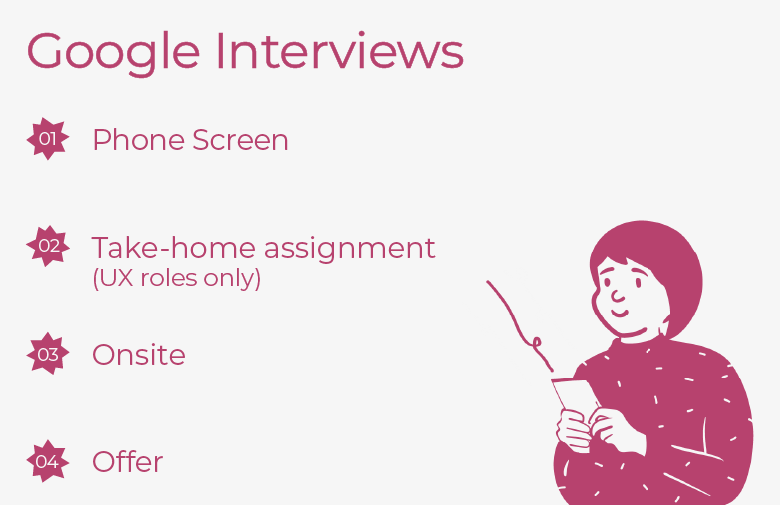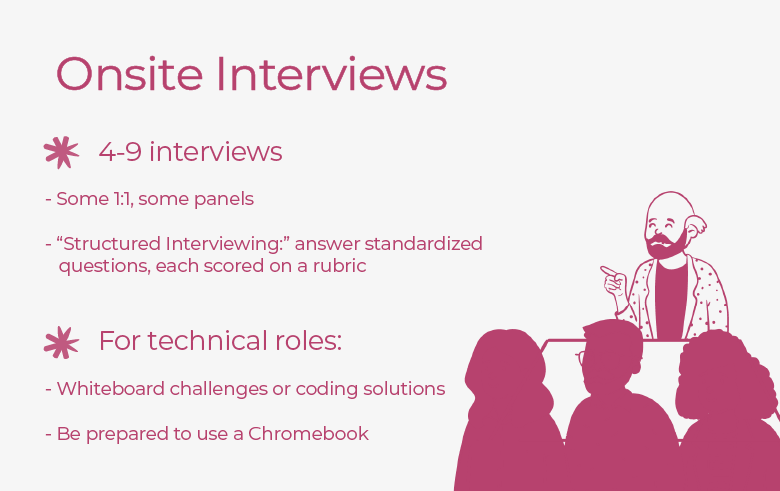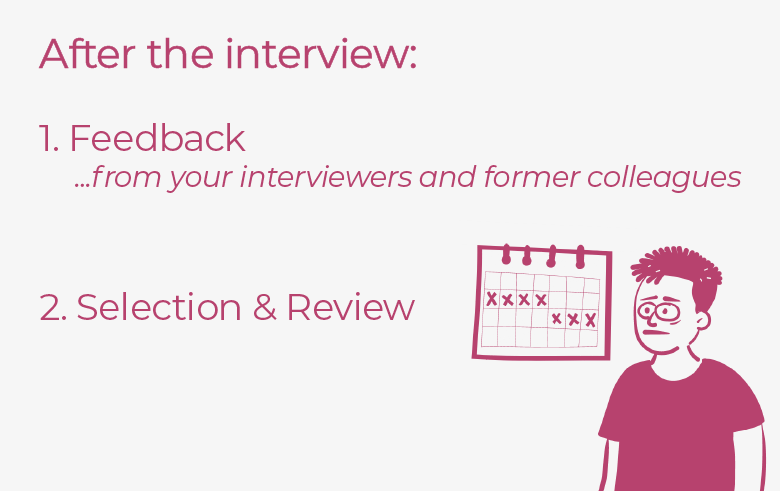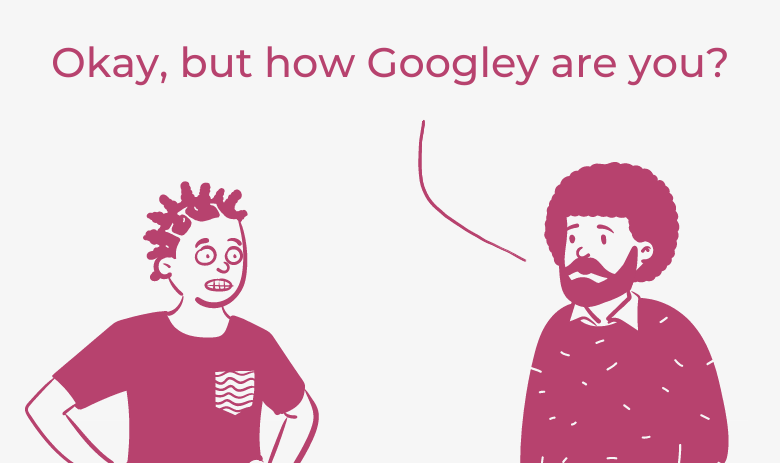Google interview process + interview questions
Every detail about the Google interview process & 100+ interview questions.

Landing one of the most enviable jobs in tech is 26 times harder than getting into Harvard University: Google’s acceptance rate is 0.2%, while Harvard’s is 5.2%.
The search engine giant on-boarded 20,000 new hires in 2019 -- shortlisted from over two million applications. Google was poised for similar growth this year, but has cut back on hiring and other nonessential expenditures as it faces an advertising slump from the pandemic.
That said, Google’s careers site currently boasts over 1,000 open positions worldwide.
In other good news, Google axed those infamous brain teaser interview questions in 2013 after internal data showed they were a weak predictor of job competency, and “served primarily to make the interviewer feel smart.”
Now that you know what won't be asked, let's talk a little more about what will. This guide will answer all your burning questions about Google's interview process, and what you can do to prepare.
👉 Try it out: Practice Google Interview Questions recruiters asked in the last 60 days
How long is the interview process?
Historically, Google’s infamous interview process involved 15-25 interviews over a period of 6-9 months. It has since been whittled down to 4-9 interviews over a period of about two months, consisting of a phone screen and onsite interviews.
According to Indeed, nearly 40% of hires are headhunted by recruiters, while 22% apply through online job boards. Some recruiters say over 80% of hires come in through sourcing or referrals!
Google’s Interview Process

1. Phone Screen (1-2 rounds)
The initial phone screen is with a prospective manager or team member, lasting 30-60 minutes depending on the role.
For Technical roles, expect some extra hurdles. Phone screens for software engineers take longer; in addition to the typical resume walkthrough, you’ll need to answer a coding question while explaining your process in a Google Doc. Additionally, the recruiter may ask for your GPA or SAT scores.
For Non-Technical roles, expect behavioral, hypothetical, and case-based questions related to the role. Be prepared for some standard questions, like...
...which you may find as a product manager candidate. However, you should also be prepared for some curveballs. One marketing manager candidate reported they were asked...
The range of questions makes proper preparation even more important!
2. UX Roles: Take Home Assignments
Some roles involve a take-home assignment with a one-week deadline. Prospective UX engineers will be assigned a project that requires them to design user flows and information architecture, create high-fidelity mockups using Sketch, and build an app.
3. Onsite Interviews (4-9 rounds)

Currently, all “onsite” interviews are being conducted via Google Hangouts, and Google’s entire workforce is working remotely through January 2021.
A typical onsite interview consists of 4-5 interviews at 45 minutes each. Some are 1:1, others are a panel.
Don’t expect questions about your resume or prior experience at this stage. Google uses a “scientifically proven” method called “structured interviewing”, where recruiters prepare a list of questions and a scoring rubric for each question. Every candidate answers the same set of questions for each role in a bid to standardize the interview process.
Applicants interviewing for technical roles will be asked to solve technical problems in real time, such as coding a solution or whiteboarding a design. Coding questions typically done on a whiteboard are executed on a Google Chromebook for a “more authentic coding experience”. Interviewees are asked to use an interview app that lets you choose your preferred programming language.
4. Offer

The hiring committee reviews each candidate. The most prolonged (and gut-wrenching) phase of the interview process is the review phase, which happens entirely behind-the-scenes and can take several weeks. This phase consists of two segments.
Here are the offer logistics. You’ll receive an offer detailing your salary, employee benefits, and stock package. Google reportedly allows candidates up to two weeks to decide whether to accept or reject the offer.
You can expect perks like on-site medical services, generous parental leave, Google’s Global Education Leave program, and even death benefits for a deceased employee’s spouse or partner at 50% of their salary every year for the next 10 years.
Like most companies, Google offers are negotiable. Before accepting, make sure you're being paid what you're worth.
What Google Looks For

According to Google’s careers website, candidates should demonstrate four key strengths throughout the interview process. Interview questions are built around these strengths, so you should be aware of them:
General Cognitive Ability
Recruiters ask open-ended questions that test a candidate’s problem-solving ability, such as...
Why they ask these questions: This type of question is designed to gauge your awareness of key barriers that come up in specific tasks, and how you would handle challenging situations under pressure.
“Your ability to explain your thought process and how you use data to inform decisions are what’s important,” according to Google’s website.
How to handle them: If you’re given an overly vague scenario, don’t just seize on the first idea that pops into your head. Show the recruiter you’re thinking critically about the question by asking for more information to narrow down the scenario.
Leadership Traits
Why they ask these questions: Even for non-managerial roles, hiring managers seek employees with a strong work ethic who exhibit leadership traits such as communication, emotional intelligence, resilience, empathy, confidence and so on.
How to handle them: Prepare 2-3 stories you can share that showed a time you took charge of a failing project or mentored a junior employee.
Role-Related Knowledge
Why they ask these questions: While role-related knowledge refers mostly to your technical skills, Google puts it more succinctly: it shows how your “individual strengths combine with your experience to drive impact.”
How to handle them: Demonstrate not only what you’ve done, but how you arrived at that conclusion, resolved that conflict, negotiated that deal, why you stood up for something no one else believed in. Describe the personal qualities and values that drive your thinking to show what you would bring to Google.
"Googleyness"
Of all the nonsense words Silicon Valley has co-opted, “Googleyness” is one of the vaguest. While Google has not provided a concrete definition for it, the company maintains it’s not to be confused with cultural fit, which has been criticized for creating homogenous workplaces that marginalize women, minorities, and non-Ivy Leaguers. In reality, Googleyness is a nebulous archetype of the ideal Google employee. Current and former Googlers on Quora offered the following interpretations:
- “Working well with others.”
- “Handling ambiguity.”
- “Approaching problems from different angles and thinking outside the box.”
- “Intellectual humility.”
- “Genuine ethical values.”
- “Above all, don’t be evil.”
Sample Interview Questions

Product manager interview questions
- What’s a product you love/hate? Why? How would you improve it?
- How would you solve homelessness in San Francisco?
- Why does Starbucks sometimes have coffee shops on both sides of the road?
- Google has invented a technology that makes air travel 4x cheaper and 4x faster. What do you do with it?
- If you could implement a new feature for Gmail, what would it be?
- What will be the impact of self-driving cars?
- What technology trends are you following at the moment?
- You're part of the Google Search web spam team. How would you detect duplicate websites?
- If you were to build the next killer feature for Google, what would it be?
- How would you determine if a new Google Search feature launch was successful?
👉 Try it out: Practice Google Interview Questions recruiters asked in the last 60 days
UX engineer interview questions
- What is A/B testing?
- How do you avoid a flash of unstyled content (FOUC) while still keeping your site accessible to all users?
- What UX news have you read lately?
- What experience have you had working alongside developers as a designer?
- Tell me about your design process.
- How would you describe interaction design to someone who’s never heard of it?
- What’s the difference between information architecture and user experience?
- How would you redesign Craigslist?
- How would you design a system for controlling a toy car using a smartphone?
- Walk me through a project you’ve worked on.
👉 Try it out: Practice Google Interview Questions recruiters asked in the last 60 days
The information provided herein is for general informational purposes only and is not intended to provide tax, legal, or investment advice and should not be construed as an offer to sell, a solicitation of an offer to buy, or a recommendation of any security by Candor, its employees and affiliates, or any third-party. Any expressions of opinion or assumptions are for illustrative purposes only and are subject to change without notice. Past performance is not a guarantee of future results and the opinions presented herein should not be viewed as an indicator of future performance. Investing in securities involves risk. Loss of principal is possible.
Third-party data has been obtained from sources we believe to be reliable; however, its accuracy, completeness, or reliability cannot be guaranteed. Candor does not receive compensation to promote or discuss any particular Company; however, Candor, its employees and affiliates, and/or its clients may hold positions in securities of the Companies discussed.
